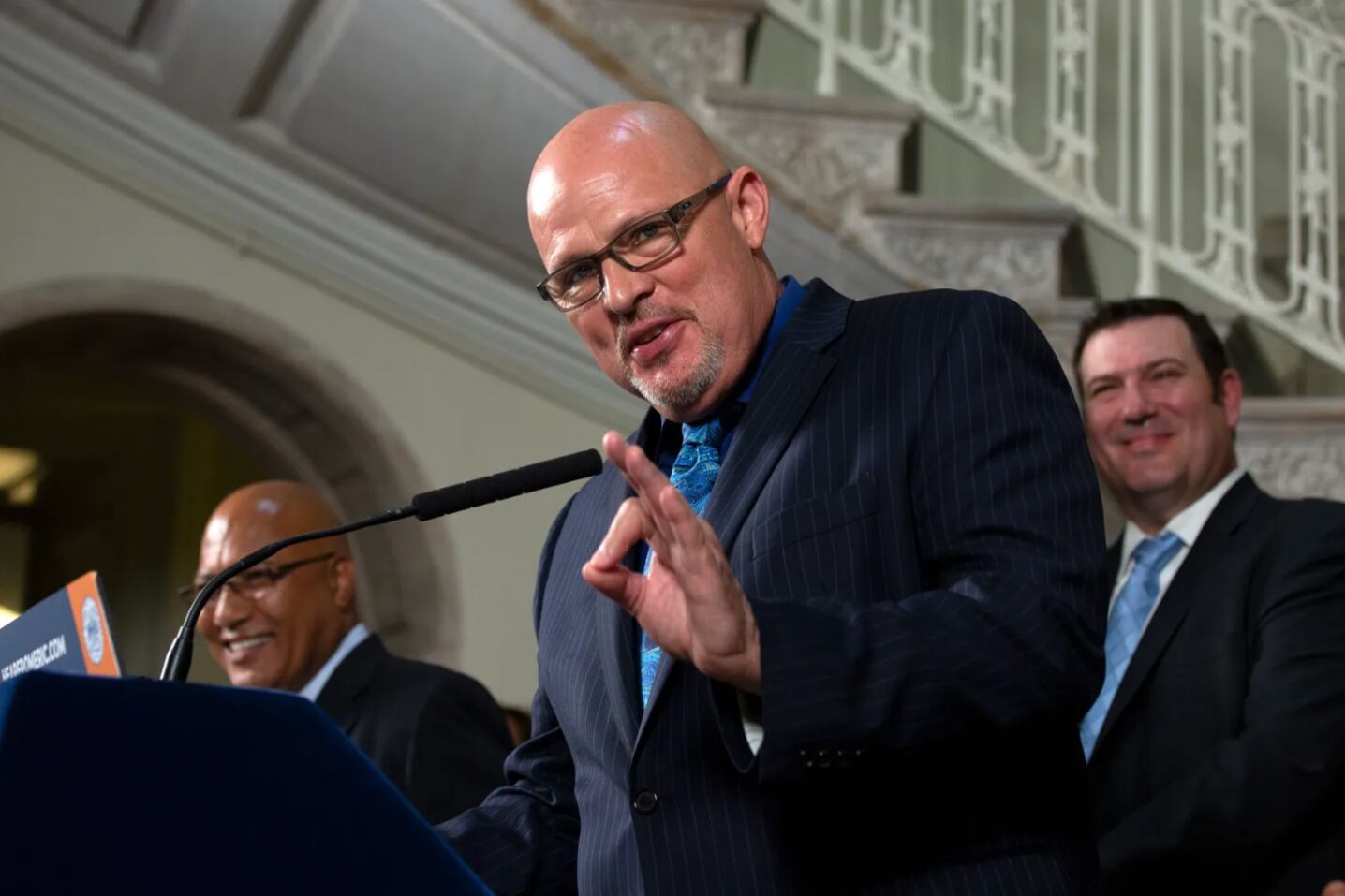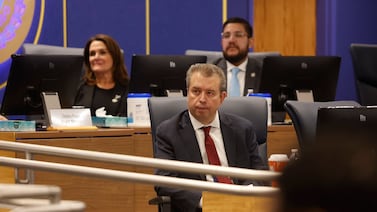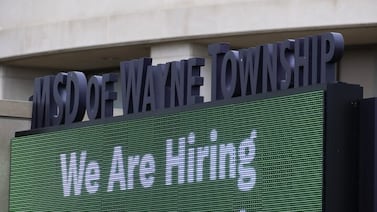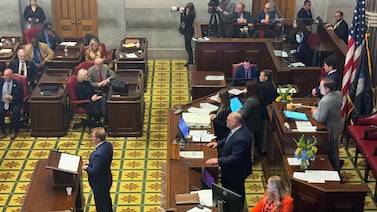A United Federation of Teachers chapter representing school therapists stood alone among chapters in rejecting their union’s tentative contract agreement with Mayor Eric Adams earlier this month — and now say UFT leadership is pressuring them to accept the deal in a revote.
In voting down the contract, chapter members expected the next step would be for their bargaining unit — which also includes audiologists, nurses and supervisors — to negotiate with city labor officials for a collective bargaining agreement that addresses their specific concerns, as happened in their last contract. Instead, chapter leaders and members say, UFT President Michael Mulgrew is urging a new vote without further talks or changes.
The 2,900 therapists and nurses are a small unit within the 120,000-member union, whose members include teachers, social workers and other city Department of Education employees. Three-quarters of the UFT membership approved the contract, the union announced earlier this month.
Within the unit, 59% of all members rejected the deal, which guarantees raises of 17.58% to 20.42% by 2026. Most of those dissenting votes came from occupational and physical therapists, who make up the majority of the unit’s members. Two-thirds of the therapists who returned ballots opposed the tentative agreement.
The independent American Arbitration Association conducted, tabulated and certified the contract vote.
Concerns about salary gaps between therapists and teachers are a major source of contention, according to chapter leaders and rank-and-file members who spoke with THE CITY. The gap is considerable: by January, a therapist with a master’s degree and 10 years of experience would earn $17,463 less annually than a teacher with the same credentials and experience, Chalkbeat reported, citing UFT documents.
By rejecting the agreement, the unit voted to not receive raises, bonuses or other benefits that go into effect for teachers and paraprofessionals this summer, and to instead continue working under their expired contract.
Vote again?
But the unit also represents nurses, audiologists, and nurse and therapist supervisors who are eager to ratify the new contract, according to Mulgrew.
Numerous members are asking for a revote, he wrote in a signed July 21 letter to chapter leadership in which he detailed efforts to split the nurses, audiologists and supervisors into their own unit so that in the future they are no longer tied in with the therapists in contract votes.
“They are pushing hard to separate as soon as possible because they feel it is unfair that, although members of each of their chapters voted overwhelmingly in favor of ratifying the contract, they will not get the new contractual benefits because their particular contract failed to get a majority of the overall votes,” Mulgrew wrote.
“We are trying to get the city and DOE to come back to the bargaining table,” he asserted in the letter even as he highlighted demands from members for an immediate revote.
That position puts him at odds with the therapists’ leadership: By a vote of 5-1 with one abstention last week, their executive board decided against a revote.
In a meeting with the therapists’ chapter on Wednesday afternoon, Mulgrew made repeated attempts to persuade members to give up on pursuing a stronger contract and to persuade them to join in a revote, claiming he had heard from 1,200 members who had demanded a new tally. Melissa Williams, the therapists’ chapter leader, asked Mulgrew for guidance on where and how the union’s constitution lays out rules for revotes.
“I’ve never had a chapter with this many people who are adamantly against the decision of their executive board,” Mulgrew said.
He added: “We have to make a decision. If we decide not to do a revote, fine. But everyone needs to understand the consequences of not revoting.”
Or bargain again?
Mulgrew also urged members to give up on trying to get a better deal. “The city isn’t interested in getting back to the bargaining table right now,” he said, noting that other legal maneuvers could potentially take years. “I can’t express this clear enough to all of you. We don’t have an avenue to get back to the bargaining table right now.”
Rank-and-file workers and union activists who spoke with THE CITY, however, said that union leadership should not entertain the prospect of a revote, but press on in trying to strike a better bargain with Adams.
Pursuing a revote of a certified election, Williams said, “calls into question the integrity of the entire process.
“I just feel bad for the people who took the time to vote,” she said in an interview with THE CITY. “I trusted that this vote had integrity, now I see that it’s wrong. It feels like a moral injury, to be honest.”
UFT spokesperson Alison Gendar said in a statement that “more than 1,000” chapter members “have asked — through emails and phone calls — for the opportunity to hold a revote.”
”The UFT leadership is working with the chapter to figure out next steps,” Gendar added.
Vocal dissent
This isn’t the first time that UFT occupational and physical therapists bucked the rest of the union in rejecting a tentative contract deal: The chapter also rejected a tentative agreement in 2018 over wage concerns. On that occasion, UFT leadership returned to the bargaining table and notched modest additional raises.
A revote without fresh contract talks was never entertained as an option after the chapter rejected the agreement in 2018, three chapter members and two union activists told THE CITY.
One reason for the standoff now with Mulgrew, activists say, is that the union’s constitution does not lay out a procedure for renegotiating rejected contracts.
“The chapter voted, and the chapter voted pretty much 2-to-1 against the contract, and to go to a revote sort of negates that process,” said chapter member and DOE physical therapist Chris Griffin, who noted she’s “not a huge ‘no’ advocate.”
Discussion of a revote “undermines that process, which was done according to established rules,” she added.
Some therapists say they would like to see Mulgrew push harder to get the city back to the bargaining table.
“I believe he’s avoiding doing his job,” said a chapter member who asked to be identified only as “E” out of fear of retaliation from her bosses. “His job is to negotiate on our behalf, not to justify the city’s stance. So I feel like he’s using that to scare us into voting yes.”
Daniel Alicea, a teacher and UFT activist, told THE CITY that the union’s leadership should convene a constitutional convention that clearly lays out a renegotiation process for rejected contracts so that “things aren’t done arbitrarily and haphazardly.”
“If we acquiesce here, this can happen in local chapter elections, it can happen in our next general election — that if they’re not happy with the result, they will find some other means.”







